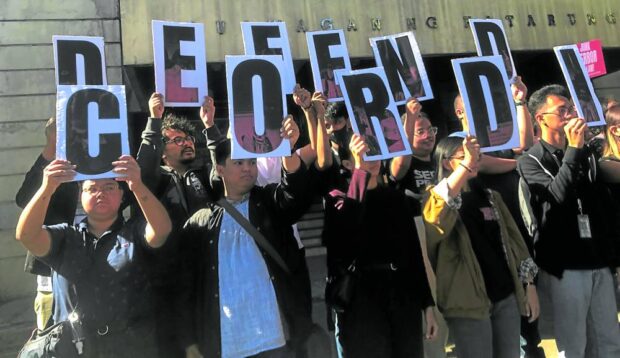Baguio activists sue government anti terror body

SUPPORT A group of activists stages a picket outside the Baguio Justice Hall on Thursday to support the four Cordillera activists who sued the Anti-Terrorism Council to remove their designation as terrorists. —VINCENT CABREZA
BAGUIO CITY—The first legal challenge to the Anti-Terrorism Council’s (ATC) power to designate terrorists was filed before a Baguio court on Thursday by four indigenous Filipino activists, who said the government deprived them of due process and had subsequently punished their families when it froze their assets.
The ATC issued Resolution No. 41 in June declaring Windel Bolinget, Steven Tauli, Jennifer Awingan-Taggaoa and Sara Abellon-Alikes as terrorists, without formally notifying them. They learned about the ATC ruling when banks notified them in July that their accounts were frozen by the Anti-Money Laundering Council.
Accompanied by lawyers Antonio La Viña and Carlos Isagani Zarate, Bolinget and the three activists asked the court to remove them from the government’s terror roster through a petition for certiorari and prohibition on the grounds that the ATC had “gravely abused its discretion.”
Zarate, a former Bayan Muna party list representative, said the Baguio lawsuit would address the constitutionality of the Anti-Terrorism Act of 2020 (Republic Act No. 11479), as well as the methods imposed to determine whether individuals subscribe to the ATC’s definition of a terrorist or terror groups.
The petition asks the court to determine if Bolinget and the three other Cordillerans had “suffered injury” because of ATC Resolution No. 41 and to decide whether RA 11479 “fails to comply with the due process requirement, violates the rights to free speech and its cognate (similar) rights, as well as the principle of the separation of powers.”
Article continues after this advertisementArbitrary
By linking the activists to unsubstantiated terror activities and associations, the actions of the ATC, led by Executive Secretary Lucas Bersamin, were both “arbitrary and unconstitutional,” according to the petition drawn up by La Viña, Zarate and lead counsel Jose Molintas, a Baguio councilor.
Article continues after this advertisement“This power to designate [terrorists in RA 11479] … does not expressly provide [legal and procedural] standards that must be observed,” the petition argues, adding that the law’s grievance mechanism was also ambiguous.
“Petitioners were condemned without meticulous regard for the decencies of a fair trial … and have no recourse to any proper procedural safeguards and remedies for an erroneous designation. In the first place, they are prohibited from accessing whatever classified evidence damning them to be judged as having met the ‘requirements for designation,’” the activists said in their petition.
They said the law’s process for delisting a designated terrorist, which is outlined in its internal rules and regulations “is illusory,” because “other than mistaken identity and death, the criteria for delisting … constrains the [designated terrorist] to virtually admit the circumstances that led to their destination.”
IPs most vulnerable
“Worse, they are already made to suffer the consequences of being a designated [terrorist] and no recourse is provided [by the law] to challenge the factual basis of their designation,” the petition stressed.
Bolinget, chair of the Baguio-based Cordillera Peoples’ Alliance (CPA), said they pursued all remedies prescribed by the law before filing the petition.
“We filed two successive appeals asking the ATC to remove our terrorist tags but it dismissed our petitions,” he told the Inquirer.
Three months ago, when CPA celebrated World Indigenous Peoples’ (IPs) Day on Aug. 9, La Viña said, “I take this [the terror designation of the CPA activists] personally.”
He was one of the lawyers who questioned the constitutionality of RA 11479 before the Supreme Court after it was signed into law by then President Rodrigo Duterte.
“An antiterror law—we argued—is most dangerous to the indigenous peoples,” La Viña had said in August, because indigenous communities were at the front lines living on ancestral lands rich in natural resources.
Bolinget is of Kankana-ey and Bontoc (Mountain Province) descent, who has been charged several times for rebellion for which he was acquitted by the courts. The nature of these government lawsuits “reveal that these charges were fabricated, baseless and were filed to harass the petitioners,” the petition says.
Like Bolinget, Alikes and Tauli (brother of former United Nations special rapporteur on indigenous peoples’ affairs Victoria Tauli-Corpuz) also belong to the Kankana-ey IP group who were charged or Red-tagged as communist rebels, while Taggaoa is a member of the Kalinga tribes of Limos and Poswoy who was also subjected to criminal complaints.
“We should all be alarmed because in the eyes of the state, indigenous peoples’ voices fighting for the rights to land and self-determination is terrorism,” said Katribu convener Beverly Longid.
When RA 11479 was being discussed in Congress, their sponsors said they would ensure the law would not be weaponized against dissenters, according to former lawmaker and Sandugo spokesperson Eufemia Cullamat.
“But this is now the direct result of that power,” she added. —WITH A REPORT FROM KRIXIA SUBINGSUBING